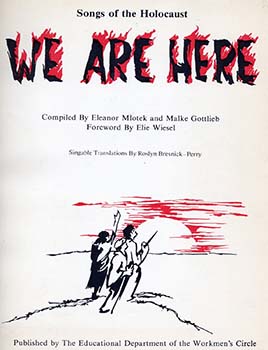Song created in the Vilno ghetto by Leyb Rozental (see note about author in Ikh Benk Aheym). It was an adaptation of an early German concentration camp song by Hans Eisler.

In the past it was life that beckoned,
Life filled with bright sunny days.
And so one and all, without thought or recall,
Went gaily their own separate ways.
It’s one, two, three, —
It’s one, two, three,
Walking to work, time would fly,
Every step ringing strong,
Every road had its song,
When you know where you’re going and why.
Forbidden for us now the sidewalk,
Though others go at will, and free.
And we, you must know,
On the stone roadway go,
Under whiplash and brutality.
It’s one, two, three,
It”s one, two, three,
The roadway is where we pass by.
The step’s far from strong,
With a difference in song,
When you’re going without knowing why.
The old people and the young ones
Built lives hoping joy lay ahead,
When a sharp sword was hurled,
Wiping dreams from the world
And like the poor sheep we were led.
It’s one, two, three,
It’s one. two, three,
Treated like sheep we stood by.
Where’s your child, where’s your wife’?
Where’s the reason for life?
No one knows the wherein or the why.
But brother, a new kind of rhythm
Will bring to your ear a new song.
And the one. who in fear
Hid, afraid to come near,
Will be marching with us
Right along.
It’s one, two, three,
It’s one, two, three,
To alleys and gateways good- bye!
Every step ringing strong
Brings a far different song,
When you go and you now know the why.
Es hot undz dos lebn gerufn,
Dos lebn fun zunike teg,
Hot yeder in land, azoy munter geshpant,
Un bazunder gegangen in veg.
Tsu eyns, tsvey, dray —
Tsu eyns, tsvey, dray,
Af arbet in veg zikh gelozt
Yeder trot hot zayn klang.
Yeder veg, zayn gezang.
Ven du veyst vu du geyst un far vos.
ltst iz far undz farvert trotuarn,
Khotsh andere geyen dort fray,
Un mir, tut a kuk
Afn shteynernem bruk,
Unter ayzerne klep fun nagay.
Tsu eyns, tsvey, dray,
Tsu eyns, tsvey, dray,
Dem bruk hot men undz nor gelozt.
Hot der trot aza klang
Gor an ander gezang,
Ven du geyst un du veyst nit far vos.
Es hobn alte un yunge
Dos lebn geboyt un gehoft.
Biz es hot aza shverd
Alts farvisht fun der erd
Un gefirt hot men undz vi di shof.
Tsu eyns, tsvey, dray,
Tsu eyns, tsvey, dray,
Azoy vi di shof zikh gelozt.
Vu dayn vayb, vu dayn kind?
Vu dos gantse gezind?
Keyner veys nit vuhin un far vos.
Nor, bruder, an anderer ritem
Vet bald tsu dayn oyer dergeyn.
Un di, vos far shrek,
Geven ersht farshtekt,
Shpanen mit undz
Nit aleyn.
Tsu eyns, tsvey, dray,
Tsu eyns, tsvey, dray,
Di geslekh, dem toyer farlozt
S’hot der trot aza klang
Gor an ander gezang.
Ven du geyst, un du veyst shoyn far vos
עס האָט אונדז דאָס לעבן גערופֿן,
דאָס לעבן פֿון זוניקע טעג
האָט יעדער אין לאַנד, אַזױ מונטער געשפּאַנט,
און באַזונדער געגאַנגען אין װעג.
צו אײנס, צװײ, דרײַ —
צו אײנס, צװײ, דרײַ,
אױף אַרבעט אין װעג זיך געלאָזט.
יעדער טראָט האָט זײַן קלאַנג,
יעדער װעג זײַן געזאַנג,
װען דו װײסט װוּ דו גײסט און פֿאַר װאָס.
איצט איז פֿאַר אונדז פֿאַרװערט טראָטואַרן,
כאָטש אַנדערע גײען דאָרט פֿרײַ,
און מיר, טוט אַ קוק,
אױפֿן שטײנערנעם ברוק.
אונטער אײַזערנע קלעפּ פֿון נאַגײַ.
צו אײנס, צװײ, דרײַ,
צו אײנס, צװײ, דרײַ,
דעם ברוק האָט מען אונדז נאָר געלאָזט.
האָט דער טראָט אַזאַ קלאַנג
גאָר אַן אַנדער געזאַנג,
װען דו גײסט און דו װײסט ניט פֿאַר װאָס.
עס האָבן אַלטע און יונגע
דאָס לעבן געבױט און געהאָפֿט
ביז עס האָט אַזאַ שװערד
אַלץ פֿאַרװישט פֿון דער ערד
און געפֿירט האָט מען אונדז װי די שאָף.
צו אײנס, צװײ, דרײַ,
צו אײנס, צװײ, דרײַ,
אַזױ װי די שאָף זיך געלאָזט,
װוּ דײַן װײַב, װוּ דײַן קינד?
װוּ דאָס גאַנצע געזינד?
קײנער װײס ניט װוּהין און פֿאַר װאָס.
נאָר, ברודער, אַן אַנדערער ריטעם
װעט באַלד צו דײַן אױער דערגײן,
און די, װאָס פֿאַר שרעק
געװען ערשט פֿאַרשטעקט,
שפּאַנען מיט אונדז ניט אַלײן.
צו אײנס, צװײ, דרײַ,
צו אײנס, צװײ, דרײַ,
די געסלעך, דעם טױער פֿאַרלאָזט!
ס׳האָט דער טראָט אַזאַ קלאַנג
גאָר אַן אַנדער געזאַנג,
װען דו גײסט, און דו װײסט שױן פֿאַר װאָס.
Song Title: Tsu Eyns, Tsvey, Dray

Compiled by sisters Malke Gottleib and Chana Mlotek, this collection of 40 songs, issued on the occasion of the 40th anniversary of the Warsaw Ghetto Uprising, reflects the suffering, despair, longing, as well as the strength, hope and courage that led the last remnant of enfeebled Jews to take up arms against the mammoth Nazi war-machine. Save for five songs, this compilation comprises songs that were actually written or sung in the ghettos and concentration camps. Four exceptions written after the war: “Babi Yar,” “Moyshelekh un Shloymelekh,” “Kadish,” and “Mayn mame hot gevolt zayn oyf mayn khasene” are often presented at commemorative gatherings and were therefore included. The fifth song “Am Yisroel Khay” was written in a D.P. camp and is an affirmation of the will of the survivors to build new lives for themselves, holding high their belief in the endurance of the Jewish people. To enable readers and singers not conversant with the Yiddish alphabet to utilize this collection, We Are Here! Songs of the Holocaust provides parallel transliterations and singable English translations by Roslyn Bresnick Perry.